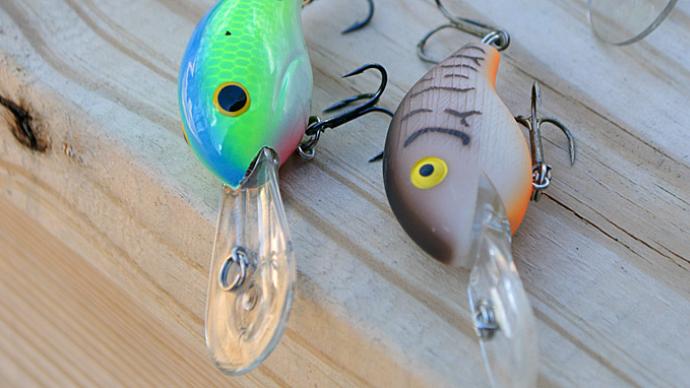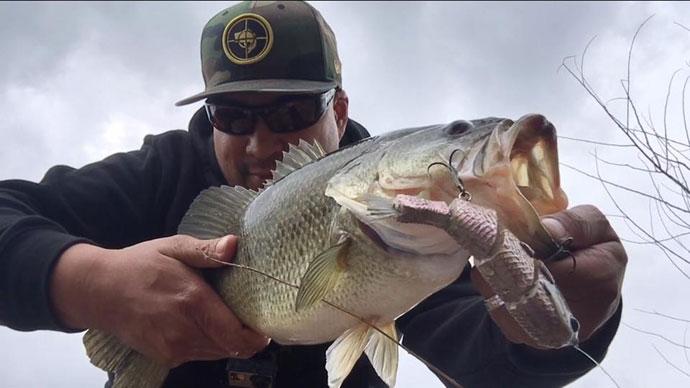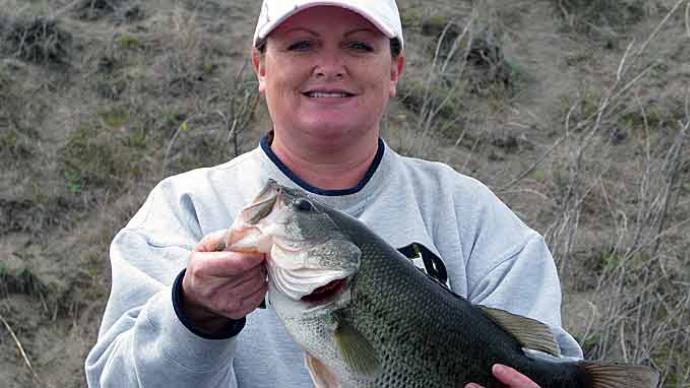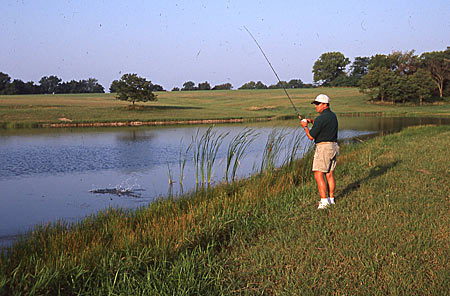
The odds of catching bass from the bank increase if you think small.
Smaller farm ponds and private lakes are the best options for fishing from the bank for bass. These waters are ideal if you only have a couple of hours to fish since you can get to the water in a few minutes, and the bass are confined to a smaller area.
“You don’t have to have a big boat and go to the big lakes all the time (to catch bass),” says Scott Pauley, a Missouri Division of Tourism outdoor marketing specialist and tournament competitor who has fished small waters for bass for more than 50 years. “The fish in these smaller lakes are in more confined areas where you can find them a little bit easier. Small lakes are great places to learn about fishing and great places to take kids fishing.”
Pauley has access to numerous farm ponds and small private lakes near his home. “They are my favorite places to fish,” he says. “The big lakes are fun, and tournament fishing is exciting, but just for a start, nothing is better than fishing these smaller bodies of water because you never know what you will hook.”
Throughout the years, Pauley has hooked several quality-size bass in these diminutive waters while fishing from the bank. “The biggest fish I’ve ever taken were two 8-pounders from Table Rock Lake, but I have caught 5- to 7-pounders more consistently in the smaller bodies of water,” says Pauley. “Most fish I catch from smaller waters are in the 4- to 6-pound range.”
Small waters can also produce good numbers of bass. The small-water expert discloses that even on the worst days, he can still catch 10 to 20 bass at farm ponds.
Small waters offer few clues to tell you whether or not big bass reside there. “It seems like some ponds don’t have very many bass, but the ones there are big, while other ponds have a lot of bass, but the fish are smaller,” says Pauley. He has noticed that small lakes with colored water and runoff usually hold bigger bass.
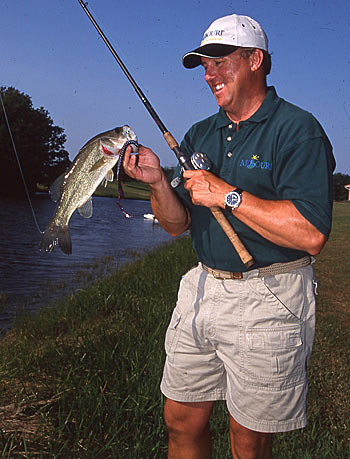
The lake's size has no bearing on whether it contains big bass. “I’ve fished ponds that were one-half acre that had 5-pounders in it,” says Pauley. However, he believes lakes larger than 10 acres will sustain a better population of big bass.
Pauley usually keys on two areas when fishing small waters from the bank. “Almost year round, I usually start at the shallow end of a pond,” he says. “It seems like most ponds have a shallow finger, and a lot of times, the more active fish will be shallow where they are easier to catch.” The other key area of a small lake is its dam. Pauley usually targets this area in the heat of the summer or the middle of a day in the spring and fall when the fish tend to prefer a steeper bank. Other small water productive areas include drop-offs, weed edges, and brush piles.
Pauley sees novice anglers make one common mistake when fishing ponds from the bank. “They want to throw as far as they can out into the middle,” he says. “But they should try to visualize how the structure of the pond lies. Does it have a creek channel or drop-off to it? They have to think about those things when fishing a pond and not just throw out there and reel in their lures.” Since most ponds are bowl-shaped, the bottom usually has a deep edge or lip where bigger bass concentrate.
Making a quick pass around the lake helps Pauley find the most productive spots in a hurry. Stealth is also a key to catching bass while fishing from the bank. “I try to walk quietly along the bank, but I keep on the move,” he says, “You also have to make your lure come in quiet. Often, those fish are super shallow, and they will be spooky.”
Light spinning tackle and small crappie jigs and spinners take plenty of bass while bank fishing the small waters. Still, Pauley prefers using heavy baitcasting equipment for flipping and pitching into the weeds and brush. His favorite lures for catching bigger bass are a jig tipped with a plastic craw, flipping tubes, 10- to 12-inch plastic worms, and chartreuse-and-white spinnerbaits.
The jig-and-craw combo is his top choice for catching the biggest bass from small waters. “It’s a productive pond lure because it imitates a crawfish, which all bass like,” says Pauley. “A jig is always the big bass lure year-round just about everywhere you go. If you look at the successes of tournament fishermen, the jig is almost always their top lure.” On overcast days, buzz baits and topwater plugs are also good choices for big bass when bank fishing.
Small waters tend to produce best in the warmer months, although those with clear water can be good in the wintertime, especially before a weather front arrives. Pauley suggests in this situation, you can try bank fishing the pond before the front to experience the best action and then make a quick getaway before the bad weather hits.
Bank fishing small waters in inclement weather or during tough fishing conditions can also help you learn to catch quality-size fish later in the larger reservoirs. “As a tournament fisherman, I used the 2 1/ 2-acre pond in my yard for a learning experiment to field test lures and techniques and to figure out what the fish did under certain conditions,” says Pauley. On large reservoirs, anglers can struggle to find concentrations of big fish in tough conditions. Still, Pauley knows precisely where the fish are on the smaller waters, so he can concentrate more on lures and techniques to trigger strikes from finicky big bass.
No matter the conditions, your chances of catching quality-sized bass are better when bank fishing on small waters than trying to pinpoint fish from a boat in the massive expanses of reservoirs and sprawling natural lakes.


